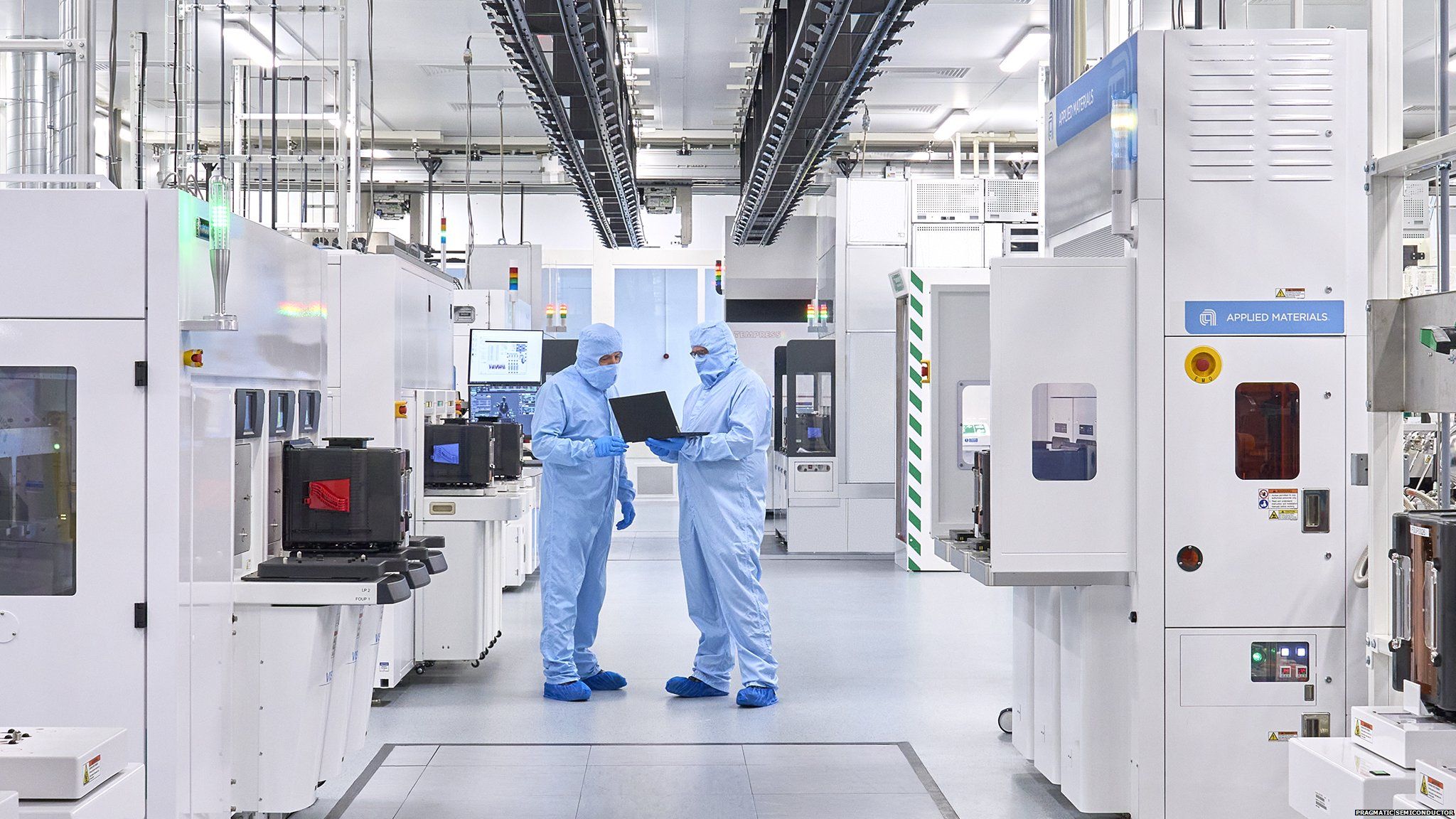Why is the world investing so much in semiconductors?
 Image source, Pragmatic Semiconductor
Image source, Pragmatic SemiconductorI'm at the UK's newest computer chip plant in Durham. Formerly a ceramic pipe factory, from the outside it looks like a big warehouse.
But inside the vast space is being transformed into a sophisticated hub for the manufacturing of computer chips.
Pragmatic Semiconductor has already built one production line, which the industry likes to call fabrication lines, or fab lines.
Sealed off in its own large room, the production line has all the expensive machinery needed to make the computer chips, and the air inside is carefully controlled to avoid any contamination during production.
Pragmatic has the money to build another such production line, and funding of £182m ($230m) announced late last year will fund production lines three and four.
As well as from private investors, Pragmatic secured funding from the government-backed UK Infrastructure Bank and British Patient Capital, a subsidiary of British Business Bank.
But the Cambridge-based company will need much more money to complete its plan to build eight production lines in the old pipe factory.
From phones and computers, to cars and washing machines, almost every product with an on-off switch relies on the production of computer chips, also known as semiconductors.
It is an industry that has seen a lot of turbulence over the last few years. There's been disruption to supply chains during the pandemic, and geopolitical tensions in Asia, where 90% of the world's most advanced chips originate.
David Moore, chief executive of Pragmatic Semiconductor, which is the largest semiconductor manufacturer in the UK, says the industry is going to need multiple types of semiconductors to solve "different kinds of problems" in the chip sector.
Most semiconductors are made using silicon, but his company is taking a different approach.
They are making flexible chips – they actually bend – at their plant in Durham, which can be used in wearable technology, clothing authentication, and even in parcel labels to track and trace items.
Rather than sitting on silicon wafer, Pragmatic's chips are built on a flexible thin film.
This approach results in chips that are cheaper and faster to manufacture than the standard silicon chip.
"If you take a standard silicon manufacturing facility, it's going to take multiple years and billions of dollars to make," Mr Moore said.
"Our fabrication plant can be 10 to 100 times cheaper depending on what you compare it with.
"In silicon, it will take three to six months to go from the start of the process all the way to a finished wafer product. For us, we can do that in less than 48 hours."
But it is no panacea. The flexible chip may be cheaper and quicker to make, but the advanced chips in phones, computers and other leading tech will still need the most advanced silicon-based computer chips.
A serious shortage of those chips in 2021, underlined how dependent global industry is on a few key suppliers.
In particular, Taiwan Semiconductor Manufacturing Company (TSMC) makes 90% of the world's most advanced semiconductors.
In an effort to cut that dependency governments are spending huge sums to create stronger domestic chip industries.
In August 2022, the US government signed into law the US Chips Act, which pledged $52bn (£41bn) to boost domestic production of computer chips.
The European Union has its own project worth €43bn (£37bn).
On a smaller scale the UK has promised £1bn of investment in the sector.
Analysts says that the big chip manufacturers are responding to such government incentives.
Germany has seen a huge wave of investment. A Taiwanese semiconductor manufacturer has decided, together with three European headquartered companies, to invest €10bn in Dresden.
"We see that 80% of of global production is currently in Asia, the reliance on Asian countries means we really need to strengthen our resilience here in the EU," notes Hendrik Abma, director general of the European Semiconductor Industry Association.
"I think the realisation about the importance of semiconductors for industry here in Europe, for our technical development, has been underestimated in the past."
As well as Germany, Mr Abma notes that Belgium, Lithuania and the Czech Republic, have seen significant investments.
Following the US Chips Act, almost 500 companies applied to the US government for funding for projects, according to Hannah Dohmen, research analyst at Georgetown's Centre for Security and Emerging Technology in Washington.
Plants are planned in New York, Arizona, Texas, Ohio and Idaho, she says.
And outside the US and Europe, other projects are planned.
"We're also seeing India attempt to enter the chip manufacturing space. A country that has a strong history in chip design but will be starting from scratch in manufacturing," Ms Dohmen added.
"India are looking to be a big player in the space, and with intensifying competition with China. This has prompted the US and other allied countries to strengthen tech cooperation with India."
It all sounds very positive but building computer chip plants is not easy.
Plans by TSMC to build advanced chips in Arizona have run into trouble, with the company blaming a shortage of skilled workers.
Others worry that the rush to build plants in Europe and the US, will just mirror what already exists in Asia.
"There's a risk of duplication and wastefulness across the industry," Ms Dohmen said.
Meanwhile, Mr Moore predicts more diversification in how semiconductors are made and what they're used for.
"You go from tens of billions of connected things to hundreds of billions and trillions of connected things, ultimately you end up with that very challenging element of not being able to supply to it, and so alternative supplies in high volume are what are going to be required.
"And being able to provide those cost effectively and at scale – that's the big challenge."
